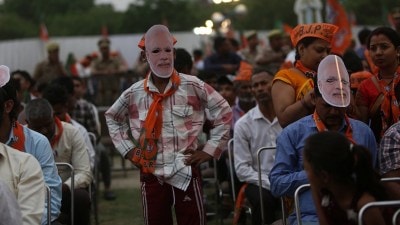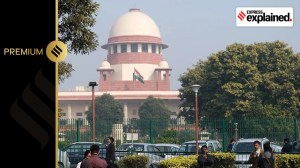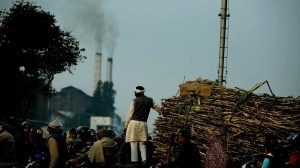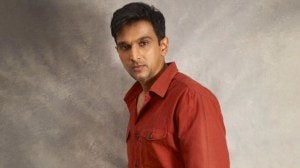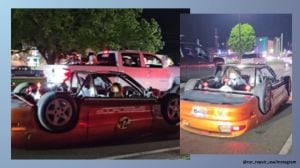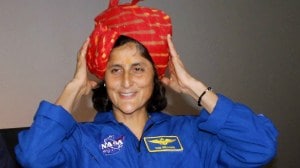- India
- International
Wary of mutations, BMC sends samples to Pune, Lucknow
Over 4,000 suspected dengue cases have been reported by the civic health department so far this year.
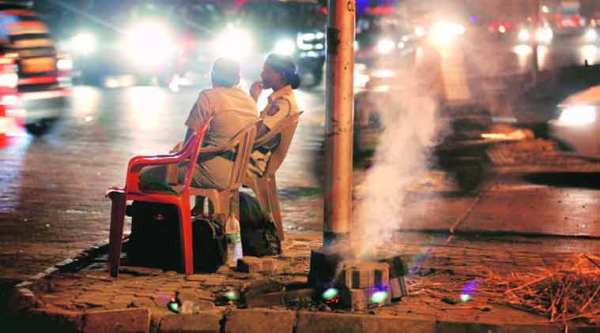 Two women constables on night duty at the Bandra-Mahim junction burn ember to keep mosquitoes away as city grapples with dengue. (Source: express photo by Vasant Prabhu)
Two women constables on night duty at the Bandra-Mahim junction burn ember to keep mosquitoes away as city grapples with dengue. (Source: express photo by Vasant Prabhu)
The rise in dengue cases this year coupled with a distinct variation in symptoms and longer need for hospitalisation of patients has prompted the Brihanmumbai Municipal Corporation (BMC) to finally get the serotypes or variations of the dengue virus tested at the country’s two premier institutes. It includes Pune-based National Institute of Virology (NIV) and Lucknow-based Sanjay Gandhi Post-Graduate Institute of Medical Sciences (SGPGI). The study of the virus’ genetic structure and discovery of possible mutations will decide the civic body’s future line of action to curb the disease.
Over 4,000 suspected dengue cases have been reported by the civic health department so far this year, including 10 confirmed and three suspected deaths due to the ailment.
The report on the virus’ possible genetic mutation can help the civic body curb the mosquito-borne viral infection to a greater extent. According to Dr Suhasini Nagda, director of medical education and major hospitals, BMC, the reports from both the institutes were expected within a fortnight.
Experts treating dengue cases across the city have observed that the virus was breaking the body’s immunity faster and dengue fever was attacking all vital organs at a greater speed. Dr Om Shrivastav, head of the infectious diseases department at Jaslok Hospital, said, “This year, the dengue patients require longer hospitalisation. The symptoms are developing quickly and in some cases, complications arise far too early.”
Nagda said the dengue mosquito, Aedes Aegypti, could multiply in any fresh water body, which was stagnant for a long duration. “We have sent the samples to these institutes to understand if there has been any cross-breeding or if the virus was becoming more resistant. This year, the cases are unusually different from last year,” Nagda said.

According to BMC’s insecticide department, while the city has the presence of all four serotypes of the dengue virus, two of the serotypes – DEN-2 and DEN-3 – are most common in Mumbai.
With prolonged heat and delay in the onset of winters, dengue cases have doubled in the past two months. From 65 dengue cases reported in August, the count escalated to 167 in September. In October, 213 confirmed cases were reported as opposed to 189 reported in October last year. The first week of November this year has recorded 41 dengue cases in public hospitals alone.
Dr Mangala Gomare, BMC’s deputy executive health officer, said the cases were under-reported as private hospitals did not have to compulsorily submit a count of dengue patients they were treating. “We are trying to convert this into a notifiable disease. For that, the state government’s approval was required,” Gomare said.
53-yr-old Mulund man dies of dengue, toll up to 13 in city
A 53-year-old man succumbed to dengue on Saturday morning, taking the death toll of the city to 13 this year, according to doctors at the Mulund-based Fortis Hospital.
The Reliance Infrastructure Limited omployee, K Radhakrishnan, suffered multiple organ failure, said a doctor from Fortis Hospital, where he was treated. Multiple organ failure is a complication that arises out of dengue hemorrhagic fever, during which the platelet count of the patient drops.
Dr Amol Vaidya, medical officer in-charge at Fortis, told Newsline, “The patient was admitted on November 8 with fever, following which he was tested positive for dengue.”
The Brihanmumbai Municipal Corporation (BMC) has so far reported 10 confirmed deaths due to dengue in the city. According to the deputy executive health officer, Dr Mangala Gomare, three other deaths, including that of Radhakrishnan, were being probed.
“We have been informed by the hospital that a man died of dengue on Saturday. But before the case papers are investigated, this is a suspected dengue death,” Gomare said.
The symptoms of dengue include fever with chills and body pain. The physician, who treated the Mulund man, confirmed that he (patient) suffered from chills and fever along with breathlessness.
Apr 25: Latest News
- 01
- 02
- 03
- 04
- 05











